City in Minnesota named for Confederate veteran from Tennessee
Published 8:26 am Wednesday, December 7, 2022
1 of 2
|
Getting your Trinity Audio player ready...
|
By Bill Carey
At a time when names of Confederate leaders are being taken off schools, landmarks and military bases throughout the South, there’s a city in Minnesota named for a Confederate veteran from Tennessee. In fact, the town doesn’t just go by the man’s last name; it goes by his first and last name.
Albert Lea, Minnesota, has a population of about 18,000. It lies near the Iowa border, about halfway between Minneapolis and Des Moines. Among the famous people who spent parts of their childhood there are the actress Marion Ross (from the sit-com “Happy Days”) and former U.S. Senator Al Franken.
The city is named for Albert Lea (1808-1891), who grew up in a house that is still standing in Grainger County, Tenn. And Albert wasn’t the only member of his family who made the history books.
The Reverend Major Lea — his first name was Major — was a Revolutionary War veteran who, like his wife Louisa Jarnigan Lea, experienced life on the Tennessee frontier when settlers were still fighting the Cherokee. Major and Louisa lived at a house in Grainger County known as Richland. They had several children, including sons Pryor (born 1794) and Albert (born 1808).
Pryor Lea served two terms in the U.S. House of Representatives, from 1827 to 1831. He was a loyal supporter of Andrew Jackson and Jackson’s policies — such as Indian Removal and opposition to internal improvements. In fact, Pryor Lea publicly clashed with a West Tennessee Congressman named David Crockett after Crockett voted against the Indian Removal Act. Crockett and Lea insulted each other repeatedly in print and probably would have gotten in a fight had they run into each other in the spring of 1829.
Pryor’s younger brother Albert went to West Point and graduated fifth out of 33 cadets in 1831. Like so many West Point graduates of that era, Albert Lea became an engineer, which in those days meant he was also a surveyor and cartographer. Albert spent his first five years out of the academy posted at Fort Des Moines. From there he explored, surveyed and mapped parts of Iowa and Minnesota, which is why Albert Lea, Minn., and the lake beside it were named for him in the 1850s.
Albert Lea went on to become assistant engineer for the state of Tennessee, an engineer for the Baltimore and Ohio Railroad, and the city engineer for Knoxville.
When the Civil War broke out, Albert Lea joined the Confederate Army, and was eventually assigned to troops led by fellow West Point graduate Colonel John Magruder. Albert’s son Edward (who had mostly been raised in the North) remained in the U.S. Navy. This father-versus-son situation created one of the most touching stories of the war.
In the Battle of Galveston (on January 1, 1863), Edward Lea was mortally wounded when his ship, the Harriet Lane, was fired upon by Magruder’s troops. The Harriet Lane raised a white flag, and when Albert Lea boarded the surrendering ship he asked if anyone had been injured during the battle. The Confederate colonel was then led to see his son, Lt. Commander Edward Lea, who lay mortally wounded.
“My father is here,” were reportedly the last words spoken by Edward Lea, and those words are inscribed on his grave.
The next day, Albert Lea had the following to say at his son’s funeral: “This singular coincidence, this sad scene, should make us ponder upon our relations to each other in this bloody struggle, and to realize that there are good and conscientious men on both sides.”
During the bitter post-war period known as Reconstruction, there were citizens of Albert Lea, Minn., who wanted the name of the town changed. However, the Minnesota legislature did not act on the suggestion, and the matter faded. Albert Lea visited the town named for him in 1879 and was treated with respect and dignity on that visit. He died in Texas in 1891.
During the last decade, as many parts of the U.S. have renamed places and landmarks named for Confederates, there have been a few newspaper and television stories about Albert Lea, Minnesota’s, unusual status in newspapers. After all, the George Floyd murder, which touched off violent protests all over the country two and a half years ago, took place less than 100 miles away.
“Our city is not named for the Albert Lea who was a Confederate soldier,” says Kathy Malakowsky, director of community engagement for Albert Lea, Minn. “Our city is named for the Albert Lea who was an explorer and cartographer.”
And, I might add, a native of Grainger County, Tenn.
Bill Carey is the founder of Tennessee History for Kids, a non-profit organization that helps teachers cover social studies.





